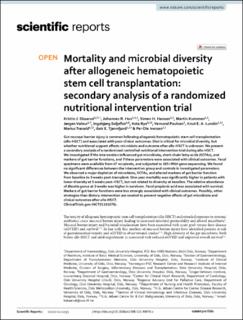| dc.contributor.author | Skaarud, Kristin Aneta Joan | |
| dc.contributor.author | Hov, Johannes Espolin Roksund | |
| dc.contributor.author | Hansen, Simen Hyll | |
| dc.contributor.author | Kummen, Martin | |
| dc.contributor.author | Valeur, Jørgen | |
| dc.contributor.author | Seljeflot, Ingebjørg | |
| dc.contributor.author | Bye, Asta | |
| dc.contributor.author | Paulsen, Vemund | |
| dc.contributor.author | Lundin, Knut Erik Aslaksen | |
| dc.contributor.author | Trøseid, Marius | |
| dc.contributor.author | Tjønnfjord, Geir Erland | |
| dc.contributor.author | Iversen, Per Ole | |
| dc.date.accessioned | 2021-06-24T12:52:48Z | |
| dc.date.available | 2021-06-24T12:52:48Z | |
| dc.date.created | 2021-06-03T14:22:21Z | |
| dc.date.issued | 2021-06-02 | |
| dc.identifier.citation | Scientific Reports. 2021, 11, (1-11). | en_US |
| dc.identifier.issn | 2045-2322 | |
| dc.identifier.uri | https://hdl.handle.net/11250/2761177 | |
| dc.description.abstract | Gut mucosal barrier injury is common following allogeneic hematopoietic stem cell transplantation (allo-HSCT) and associated with poor clinical outcomes. Diet is critical for microbial diversity, but whether nutritional support affects microbiota and outcome after allo-HSCT is unknown. We present a secondary analysis of a randomized controlled nutritional intervention trial during allo-HSCT. We investigated if the intervention influenced gut microbiota, short-chain fatty acids (SCFAs), and markers of gut barrier functions, and if these parameters were associated with clinical outcomes. Fecal specimens were available from 47 recipients, and subjected to 16S rRNA gene sequencing. We found no significant differences between the intervention group and controls in investigated parameters. We observed a major depletion of microbiota, SCFAs, and altered markers of gut barrier function from baseline to 3 weeks post-transplant. One-year mortality was significantly higher in patients with lower diversity at 3 weeks post-HSCT, but not related to diversity at baseline. The relative abundance of Blautia genus at 3 weeks was higher in survivors. Fecal propionic acid was associated with survival. Markers of gut barrier functions were less strongly associated with clinical outcomes. Possibly, other strategies than dietary intervention are needed to prevent negative effects of gut microbiota and clinical outcomes after allo-HSCT. | en_US |
| dc.description.sponsorship | The study was supported by Oslo University Hospital, Larvik Cancer Society, Norwegian Nurses Organization and the Throne Holst Foundation, Norway. The tube feeding was provided by Nutricia, Norway. | en_US |
| dc.language.iso | eng | en_US |
| dc.publisher | Nature Research | en_US |
| dc.relation.ispartofseries | Scientific Reports;11:11593 | |
| dc.rights | Navngivelse 4.0 Internasjonal | * |
| dc.rights.uri | http://creativecommons.org/licenses/by/4.0/deed.no | * |
| dc.subject | Mortality | en_US |
| dc.subject | Microbial diversities | en_US |
| dc.subject | Stem cells | en_US |
| dc.subject | Transplantation | en_US |
| dc.subject | Nutritional intervention trials | en_US |
| dc.title | Mortality and microbial diversity after allogenic hematopoietic stem cell transplantation: secondary analysis of a randomized nutritional intervention trial | en_US |
| dc.type | Peer reviewed | en_US |
| dc.type | Journal article | en_US |
| dc.description.version | publishedVersion | en_US |
| dc.rights.holder | © The Author(s) 2021. | en_US |
| dc.source.articlenumber | 11593 | en_US |
| cristin.ispublished | true | |
| cristin.fulltext | original | |
| cristin.qualitycode | 1 | |
| dc.identifier.doi | https://doi.org/10.1038/s41598-021-90976-z | |
| dc.identifier.cristin | 1913594 | |
| dc.source.journal | Scientific Reports | en_US |
| dc.source.volume | 11 | en_US |
| dc.source.pagenumber | 11 | en_US |

